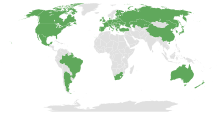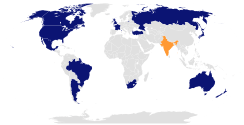Nuclear Suppliers Group
Nuclear Suppliers Group (NSG) is a group of nuclear supplier countries that seek to prevent nuclear proliferation by controlling the export of materials, equipment and technology that can be used to manufacture nuclear weapons.
History
The NSG was founded in response to the Indian nuclear test in May 1974[1] and first met in November 1975. The test demonstrated that certain non-weapons specific nuclear technology could be readily turned to weapons development. Nations already signatories of the Nuclear Non-Proliferation Treaty (NPT) saw the need to further limit the export of nuclear equipment, materials or technology. Another benefit was that non-NPT and non-Zangger Committee nations, then specifically France, could be brought in.
A series of meetings in London from 1975 to 1978 resulted in agreements on the guidelines for export, these were published as INFCIRC/254 (essentially the Zangger "Trigger List") by the International Atomic Energy Agency. Listed items could only be exported to non-nuclear states if certain International Atomic Energy Agency safeguards were agreed to or if exceptional circumstances relating to safety existed.
The name of the "London Club" was due to the series of meetings in London. It has also been referred to as the London Group, or the London Suppliers Group.
The NSG did not meet again until 1991. The "Trigger List" remained unchanged until 1991, although the Zangger list was regularly updated. The revelations about the Iraqi weapons program following the first Gulf War led to a tightening of the export of so-called dual-use equipment. At the first meeting since 1978, held at the Hague in March 1991, the twenty-six participating governments agreed to the changes, which were published as the "Dual-use List" in 1992, and also to the extension of the original list to more closely match the up-to-date Zangger list.
Participating governments

Initially the NSG had seven participating governments: Canada, West Germany, France, Japan, the Soviet Union, the United Kingdom, and the United States. In 1976-77, participation was expanded to fifteen with the admittance of Belgium, Czechoslovakia, East Germany, Italy, the Netherlands, Poland, Sweden, and Switzerland. Germany was reunited in 1990 while Czechoslovakia broke up into the Czech Republic and Slovakia in 1993. Twelve more nations joined up to 1990. Following the collapse of the Soviet Union a number of former republics were given observer status as a stage towards future membership. China became a participating government in 2004. The European Commission and the Zangger Committee Chair participate as observers. The NSG Chair for 2015-2016 is Argentina.[2]
As of 2016 the NSG has 48 members:[3]
 Argentina
Argentina Australia
Australia Austria
Austria Belarus
Belarus.svg.png) Belgium
Belgium Brazil
Brazil Bulgaria
Bulgaria Canada
Canada China
China Croatia
Croatia Cyprus
Cyprus Czech Republic
Czech Republic Denmark
Denmark Estonia
Estonia Finland
Finland France
France Germany
Germany Greece
Greece Hungary
Hungary Iceland
Iceland Ireland
Ireland Italy
Italy Japan
Japan Kazakhstan
Kazakhstan Latvia
Latvia Lithuania
Lithuania Luxembourg
Luxembourg Malta
Malta Mexico
Mexico Netherlands
Netherlands New Zealand
New Zealand Norway
Norway Poland
Poland Portugal
Portugal Romania
Romania Russia
Russia Serbia
Serbia Slovakia
Slovakia Slovenia
Slovenia South Africa
South Africa South Korea
South Korea Spain
Spain Sweden
Sweden Switzerland
Switzerland Turkey
Turkey Ukraine
Ukraine United Kingdom
United Kingdom United States
United States
Candidate members
India

During a state visit to India in November 2010, U.S. President Barack Obama announced U.S. support for India's participation in the Nuclear Suppliers Group, the Wassenaar Arrangement, the Australia Group and the Missile Technology Control Regime, "in a phased manner," and to encourage the evolution of regime participation criteria to that end, "consistent with maintaining the core principles of these regimes."[4][5][6]
During a visit to India in December 2010, French President Sarkozy also expressed his country's backing for India's inclusion in Nuclear Suppliers Group.[7] The United Kingdom has for a long time been a supporter of India's inclusion in the Nuclear Suppliers Group.[8] During Republic Day visit of India in January 2015, Obama said that India was ready for NSG membership.[9] Russian president Vladimir Putin has also offered unconditional support to India's entry into NSG.[10]
Switzerland also announced its backing on India's Membership in 48 member group on 6 June 2016 during PM Modi's visit to Geneva,[11] but withdrew support later.[12] President Obama reiterated U.S. support for India's NSG membership on 8 June 2016 during PM Modi's visit to Washington DC.[13] Japan has expressed support for India's bid for membership of the NSG.[14] However China is opposing India's membership to NSG.[15] Other countries opposing Indian membership of the Nuclear Suppliers Group (NSG) include New Zealand, Ireland, Turkey and Austria.[15]
In June 2016, India got crucial support from Mexico in its bid to become a member of the NSG ahead of a plenary meeting of the 48-nation bloc whose members are allowed to trade in and export nuclear technology.[16] On 17 June, British Premier David Cameron had assured Prime Minister Narendra Modi of the UK's "firm support" for India's NSG membership bid.[17] In an interview on 18 June, Russian President Vladimir Putin said that he was 'positive' about India's entry into NSG.[18] On 20 June, Canada stated that NSG will be strengthened with India's presence.[19] On 22 June France reiterated its support to India, and urged all the other 48 members of the NSG to allow entry for India into the atomic control body.[20] China remains opposed to Indian membership.[21]
In July 2016, South Africa agreed to back India's entry into the NSG.[22] In August 2016, Turkey confirmed support for India's NSG membership bid.[23] In 4 September 2016, Australia reiterated its commitment to India's bid for membership of the Nuclear Suppliers Group just ahead of the G20 summit in Hangzhou, China.[24] In 5 September 2016, Prime Minister Narendra Modi thanked Argentina for backing India's bid.[25]
In 17 October 2016, following the BRICS summit in Benaulim, Goa, Brazil officially backed India's bid for NSG membership.[26][27][28] On 26 October 2016, Prime Minister Key of New Zealand stated that "New Zealand would continue to contribute constructively to the process currently underway in the NSG to consider India’s membership."[29]
Pakistan
Pakistan applied for membership on 19 May 2016.[30] Pakistan is supported by Turkey and China.[31][32] However, many NSG members opposed Pakistan’s membership bid because of its track record, including the illicit procurement network of Pakistani scientist A.Q. Khan, which aided the nuclear programs of Iran, Libya and North Korea.[33][34] Pakistani officials reiterated the request in August 2016.[35]
In September 2016, Pakistan gained support for its NSG membership bid from Kazakhstan and Belarus.[36]
Namibia
Namibia applied for NSG membership in 2016.[37]
Role in India-US nuclear agreement
In July 2006, the United States Congress amended U.S. law to accommodate civilian nuclear trade with India. A meeting of NSG participating governments on 21–22 August 2008 on an India-specific exemption to the Guidelines[38] was inconclusive. Several participating governments, including Austria, Switzerland, Norway, Ireland, and New Zealand, expressed reservations about the lack of conditions in the proposed exemption.[39] In another meeting on 6 September 2008, the NSG participating governments agreed to grant India a "clean waiver" from its existing rules, which forbid nuclear trade with a country which has not signed the Nuclear Non-Proliferation Treaty (NPT). The NSG's decision came after three days of intense U.S. diplomacy.[40] The approval was based on a formal pledge by India stating that it would not share sensitive nuclear technology or material with others and would uphold its voluntary moratorium on testing nuclear weapons. The pledge was contained in a crucial statement issued during the NSG meeting by India outlining the country's disarmament and nonproliferation policies.[41]
References
- ↑ User, Super. "Nuclear Suppliers Group - History". www.nuclearsuppliersgroup.org. Retrieved 28 June 2016.
- ↑ User, Super. "Nuclear Suppliers Group - Organisation".
- ↑ NUCLEAR SUPPLIERS GROUP.
- ↑ "Obama seeks expanded India-US trade". Al Jazeera English. 6 November 2010. Retrieved 7 November 2010.
- ↑ "Obama in Mumbai Calls India Market of the Future". Voice of America. 6 November 2010. Retrieved 7 November 2010.
- ↑ FACT SHEET: U.S.-INDIA PARTNERSHIP ON EXPORT CONTROLS AND NON-PROLIFERATION, The White House, Office of the Press Secretary, 8 November 2010.
- ↑ "India and France hold key nuclear talks".
- ↑ "Written Answers - India". Hansard. 1 July 2013. 1 July 2013 : Column 504w. Retrieved 2 July 2013.
- ↑ "As Modi hugs Obama, China sends a quick flying kiss". India Today. ANI. 26 January 2015. Retrieved 23 June 2016.
- ↑ "After India, Pak now wants US to support its NSG bid". The Indian EXPRESS. ANI. 9 June 2016. Retrieved 10 June 2016.
- ↑ "Swiss support for NSG secured, PM Modi lands in US". 7 June 2016.
- ↑ Switzerland takes U-turn on its support to India's NSG bid, Times of India, Ankita Rajeshwari, 24 June 2016.
- ↑ "President Obama backs Indian entry to nuclear technology - BBC News".
- ↑ "Will work together to ensure India is in NSG: Japan - Times of India".
- 1 2 Reuters (9 June 2016). "China leads resistance to India joining Nuclear Suppliers Group: diplomats". www.dawn.com. Retrieved 9 June 2016.
- ↑ "Mexico backs India's Nuclear Suppliers Group bid". 9 June 2016.
- ↑ PTI (17 June 2016). "UK backs India's NSG bid".
- ↑ "Exclusive: Positive about Indias entry into NSG: Vladimir Putin to India Today".
- ↑ "NSG will be strengthened if India joins: Canada - Times of India".
- ↑ "France calls for other members of NSG to support India's entry.".
- ↑ "China's Ban On India's Entry Into NSG Highlights Necessity For Closer Indo-US Ties – OpEd". 27 June 2016.
- ↑ "After China, Switzerland's no, South Africa agrees to back India's NSG bid". 8 July 2016.
- ↑ "Turkey confirms support for India's membership in NSG - The Economic Times".
- ↑ "Australia Backs India's Nuclear Club Membership Bid Ahead of G20 Meeting".
- ↑ "PM Modi thanks Argentina for backing India's NSG bid". 5 September 2016.
- ↑ "PM Modi thanks Brazil for support to India's NSG bid - Times of India".
- ↑ "Brazil supports India's NSG bid".
- ↑ IANS (17 October 2016). "Modi thanks Brazil for support to India's NSG bid" – via Business Standard.
- ↑ "New Zealand backs India's NSG bid - The Economic Times".
- ↑ "NSG to take up Pakistan, India's membership requests this week". retrieved on 23 June 2016. Dawn.
- ↑ Pakistan appreciates China’s unequivocal support for admission in NSG, retrieved 25 June 2016, The Indian Express
- ↑ "Kiwis soft on India's NSG bid, Turkey backs Pak - TOI Mobile | The Times of India Mobile Site". m.timesofindia.com. Retrieved 20 June 2016.
- ↑ "China says more talks needed to build consensus on nuclear export club". 12 June 2016 – via Reuters.
- ↑ Guardia, By Ahmed Rashid in Lahore and Anton La. "I've sold nuclear secrets to Libya, Iran and N Korea".
- ↑ "Pakistan launches fresh push for NSG membership". 23 August 2016. Retrieved 24 August 2016.
- ↑ "Belarus, Kazakhstan assure support for Pakistan's NSG membership: Fatemi - The Express Tribune". 5 September 2016.
- ↑ "After India and Pakistan, now Namibia throws its hat in the ring for NSG entry - The Economic Times".
- ↑ "Text of U.S. NSG Proposal on India".
- ↑ "UPDATE 3-Nuclear suppliers propose terms for U.S.-India deal".
- ↑ Varadarajan, Siddharth (7 September 2008). "Reality, one bite at a time: Dateline Vienna: NSG waiver enables member states to provide India full civil nuclear cooperation".
- ↑ Varadarajan, Siddharth (8 September 2008). "Reality, one bite at a time: Dateline Vienna: Thirty words that saved the day".
External links
- NSG - Official Website
- "The Nuclear Suppliers Group: Its origins, role and activities."
- Nuclear Suppliers Guidelines Part 1 - Trigger List
- Nuclear Suppliers Guidelines Part 2 - Dual Use
- NSG draft waiver for India
- As Modi hugs Obama, China sends a quick flying kiss